
When preparing for an SEO job interview, it's useful to familiarize yourself with the most common SEO interview questions that hiring managers tend to ask.
Preparing for these SEO interview questions can not only help you show your knowledge and expertise but also give you the confidence to impress the interviewer and ace the interview.
Meticulous preparation will allow you to appear confident and in control, helping position you as the ideal candidate when the competition is tough.
- Vicky Oliver, Career Development Consultant
In this blog post, we'll look at more than 30 commonly asked SEO interview questions and provide answers that you can use to formulate your responses.
Let's start off with some of the more general SEO interview questions that you might get asked, along with the answers for each.
General SEO Interview Questions
Can you explain the difference between on-page and off-page SEO?
On-page SEO involves optimizing elements on your website, like content, meta tags, and internal links, to improve search engine rankings. Off-page SEO focuses on building your site's authority through external actions like backlinking and social media engagement.
On-page and off-page SEO work together to improve your search engine rankings in a complementary fashion.
- George Zlatin, Chief Marketing and Product Officer at Digital Third Coast
What are the key elements of an SEO-friendly website?
The key elements of an SEO-friendly website include:
- High-quality content that’s relevant, engaging, and optimized with the right keywords.
- Clean and organized site structure that allows for easy navigation and proper internal linking.
- Fast page loading speed to enhance user experience and meet search engine criteria.
- Mobile-friendliness which ensures the site is responsive on all devices.
- Optimized meta tags including title tags, meta descriptions, and header tags.
- Secure and accessible URLs with HTTPS for security.
How do search engines work?
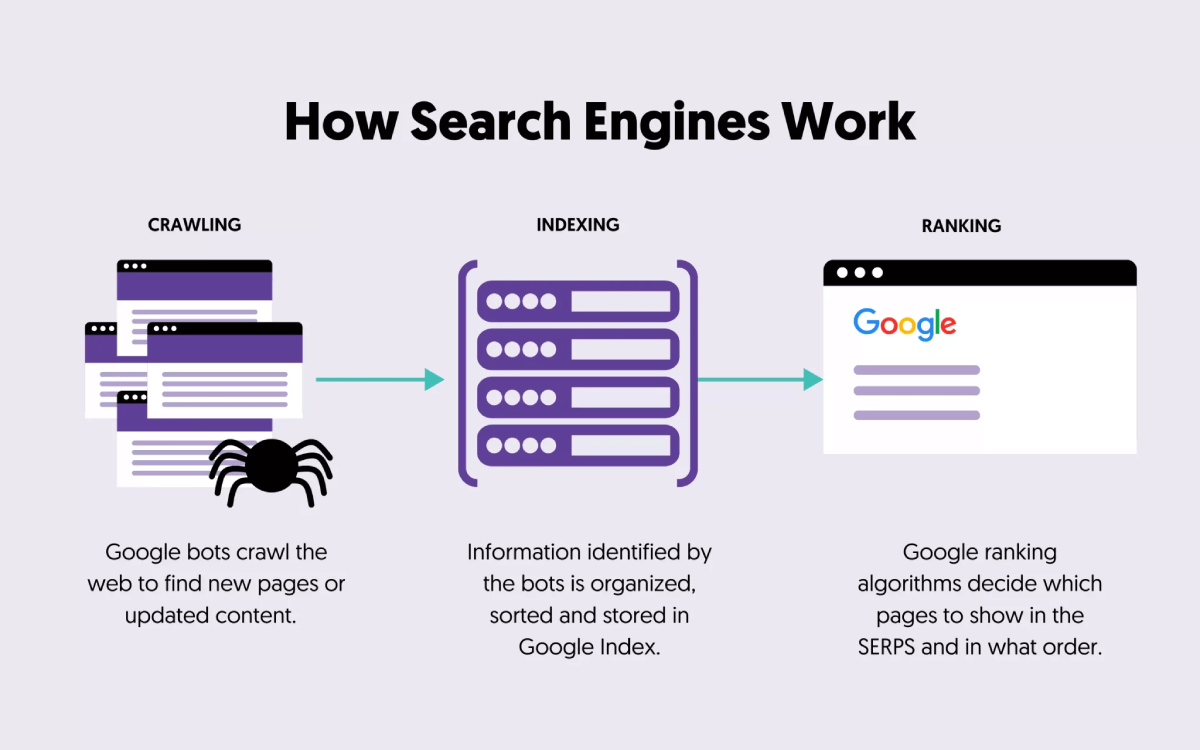
Search engines operate through three main processes: crawling, indexing, and ranking.
Crawling involves scanning the web to discover new and updated content using bots called spiders. Indexing is the organization of this content into a database, where it can be retrieved quickly.
Finally, ranking determines the order of search results based on relevance to the search query.
Together, these processes ensure users receive the most relevant search results.
What are the most important Google ranking factors?
You might get asked this question in an SEO interview to assess your understanding of the core principles of SEO and to see if you're up-to-date with the factors that Google prioritizes when ranking websites.
The most important Google ranking factors include:
- Good content that is relevant, well-researched, and valuable to users.
- Backlinks from authoritative and relevant sites, which boost your site’s credibility.
- A fast loading website that provides a great user experience.
- User experience (UX) factors like site structure, navigation, and engagement metrics.
- On-page SEO elements, including keyword optimization, meta tags, and header tags.
- Secure and accessible website using HTTPS for security.
What is the role of keywords in SEO?
Keywords help search engines understand the content and context of your website.
The most basic signal that information is relevant is when content contains the same keywords as your search query. For example, with web pages, if those keywords appear on the page, or if they appear in the headings or body of the text, the information might be more relevant.
By strategically placing relevant keywords in your content, meta tags, and headings, you signal to search engines what your page is about, making it easier for them to match your site with users' search queries.
Keywords help drive targeted traffic to your site by aligning your content with what users are searching for.
This question is often asked in SEO interviews to gauge your understanding of how keywords influence search engine rankings and to see if you know how to use them effectively without keyword stuffing.
What are long-tail keywords, and why are they important?
Long-tail keywords are longer, more specific keyword phrases that usually have lower search volume but higher intent. They are important because they attract highly targeted traffic, often leading to better conversion rates.
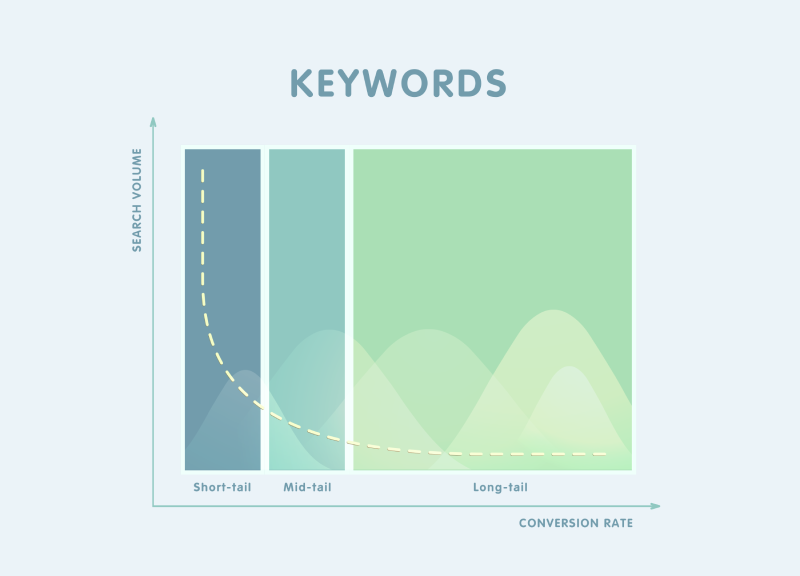
Since they are less competitive, it's easier to rank for long-tail keywords, making them a valuable part of an SEO strategy.
A hiring manager might ask this SEO interview question to assess your understanding of keyword strategy, particularly how to target niche audiences and improve conversion rates. It shows that you know how to optimize content to attract the right users, not just more users.
What is the importance of meta tags in SEO?
A hiring manager might ask this SEO interview question to evaluate your understanding of on-page SEO and how you can use meta tags to enhance visibility in search results.
It also tests your ability to balance search engine requirements with user engagement.
Here's a sample answer for this interview question:
Meta tags are important in SEO because they provide search engines with essential information about a webpage’s content. The most critical meta tags are the title tag and meta description.
The title tag helps search engines understand the page's topic and is often the first impression users see in search results. The meta description provides a brief summary, encouraging users to click through to your site.
Well-optimized meta tags can improve click-through rates and contribute to higher rankings.
How do you conduct keyword research?
Keyword research is a core aspect of SEO, making it a question that’s likely to be asked in all SEO interviews.
Understanding how to find and target the right keywords can significantly impact a website’s visibility, and if you're interviewing for an SEO role, keyword research will likely be one of the things you're going to do on a regular basis.
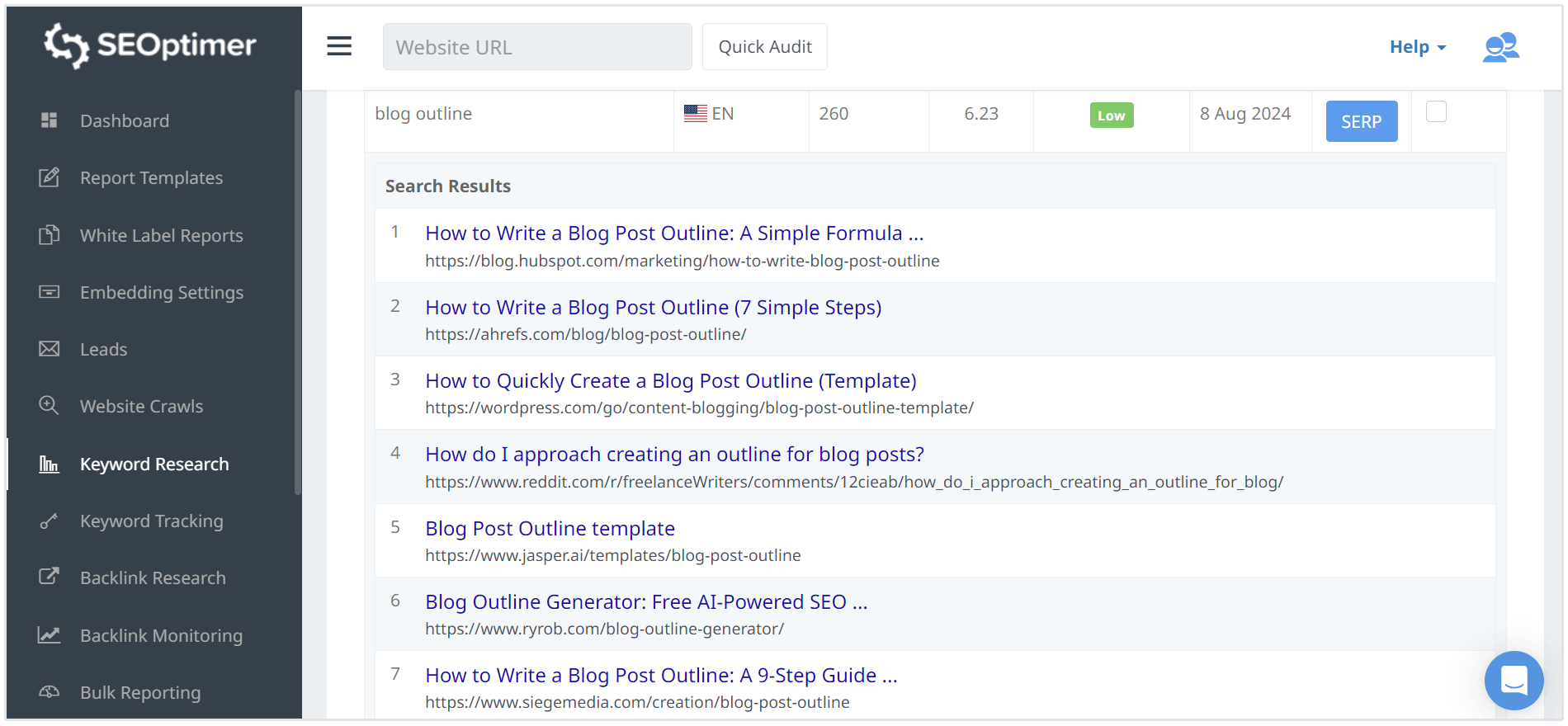
Here's a sample answer for this SEO interview question:
To conduct keyword research, I start by identifying the main topics relevant to the business or website. I use tools like Google Keyword Planner and SEOptimer to find keywords related to these topics, analyzing their search volume, competition, and relevance.
I also look at competitor keywords to find opportunities. After gathering a list of potential keywords, I prioritize them based on user intent, relevance, and the likelihood of driving targeted traffic.
What is the difference between white hat, black hat, and gray hat SEO?
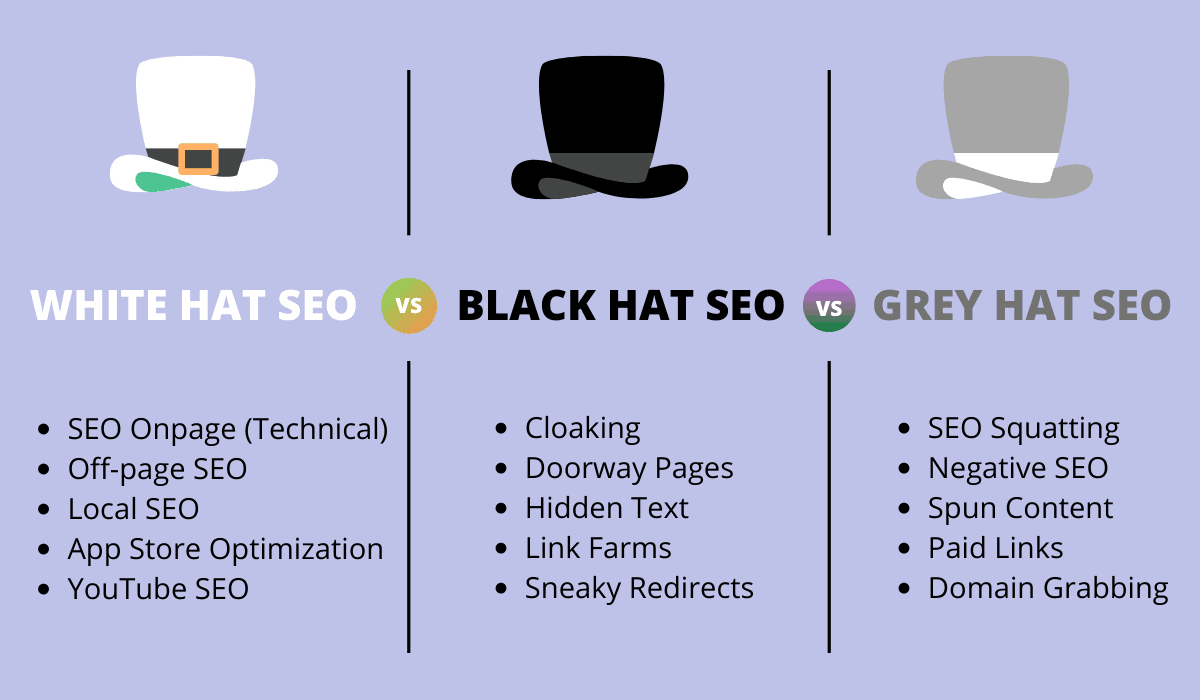
White hat SEO refers to ethical practices that comply with search engine guidelines, focusing on creating high-quality content and improving user experience. Techniques include optimizing content, building genuine backlinks, and ensuring a good site structure.
Black hat SEO involves manipulative techniques that violate search engine guidelines to achieve quick results. This includes tactics like keyword stuffing, cloaking, and using link farms. While these methods might offer short-term gains, they risk severe penalties or being banned by search engines.
Gray hat SEO falls in between, using techniques that are not explicitly against guidelines but are somewhat ambiguous or risky. This might involve tactics like aggressive link building or content spinning that could potentially lead to issues if not managed carefully.
This question helps hiring managers assess your understanding of SEO ethics and the implications of different practices on a site's long-term success.
How do you measure the success of an SEO campaign?
Measuring the success of an SEO campaign is crucial because it helps determine if your efforts are achieving the desired results. Effective measurement ensures that resources are being used efficiently and that your SEO tactics are aligned with business goals.
Sample Answer: To measure the success of an SEO campaign, I track key performance indicators such as organic traffic, keyword rankings, and conversion rates using tools like Google Analytics and Google Search Console. I also monitor metrics like bounce rate, click-through rate (CTR), and the quality of backlinks.
Regularly reviewing these metrics allows me to assess the impact of the SEO efforts and make data-driven adjustments to optimize performance.
What tools do you use for SEO analysis and reporting?
Tying in with the above question, you might get asked which tools you use for SEO analysis and reporting.
While there's no correct answer to this question, interviewers will want to see if you know your way around the different SEO tools that are on the market.
Here's a sample answer for this SEO interview question:
I utilize a variety of tools to gain comprehensive insights and track performance. Google Analytics and Google Search Console are essential for monitoring website traffic and understanding search engine visibility. I also use tools like SEOptimer for keyword tracking, competitor analysis, and backlink tracking.
How do you stay updated with the latest SEO trends and algorithm changes?
Google regularly tweaks their search engine algorithms (these are called Core Updates), so it's important to stay updated with the latest trends and algorithm changes.
To keep up with the latest developments, many SEOs turn to reputable publications and resources such as:
- Search Engine Journal
- SEOptimer blog
- Search Engine Land
- Google's Webmaster Central Blog
- Search Engine Roundtable
Technical SEO Interview Questions
Can you explain what a canonical tag is and why it's used?
A canonical tag is an HTML element used to indicate the preferred version of a webpage when there are multiple pages with similar or duplicate content. It helps prevent duplicate content issues by telling search engines which version to index and rank.

This ensures that the correct page gains the SEO benefits, such as link equity, rather than splitting it across multiple versions.
A hiring manager might ask this question to gauge your understanding of technical SEO and your ability to manage duplicate content issues, which are important for maintaining a site’s search engine rankings.
What is the impact of page speed on SEO?
A hiring manager might ask this question to assess your understanding of how technical factors like page speed influence search rankings and user experience.
The simple answer is that page speed does affect SEO. Page speed is a direct ranking factor, a fact known even better since Google’s Algorithm Speed Update.
- Adrian Cojocariu, SEO Analyst
Here's a sample answer for this SEO interview question:
Page speed significantly impacts SEO because faster-loading pages provide a better user experience, which search engines like Google prefer. Slow pages can lead to higher bounce rates, lower user engagement, and lower rankings in search results.
What is a robots.txt file, and how is it used in SEO?
A robots.txt file is a text file located in the root directory of a website that instructs search engine crawlers on which pages or sections of the site they can or cannot access.
It’s used in SEO to manage crawling activity, ensuring that search engines don’t index certain pages (like admin pages) that are not meant for public viewing.
Proper use of the robots.txt file helps control what gets indexed, improving the efficiency of crawling and preventing issues with duplicate content.
Can you explain what an XML sitemap is and its role in SEO?
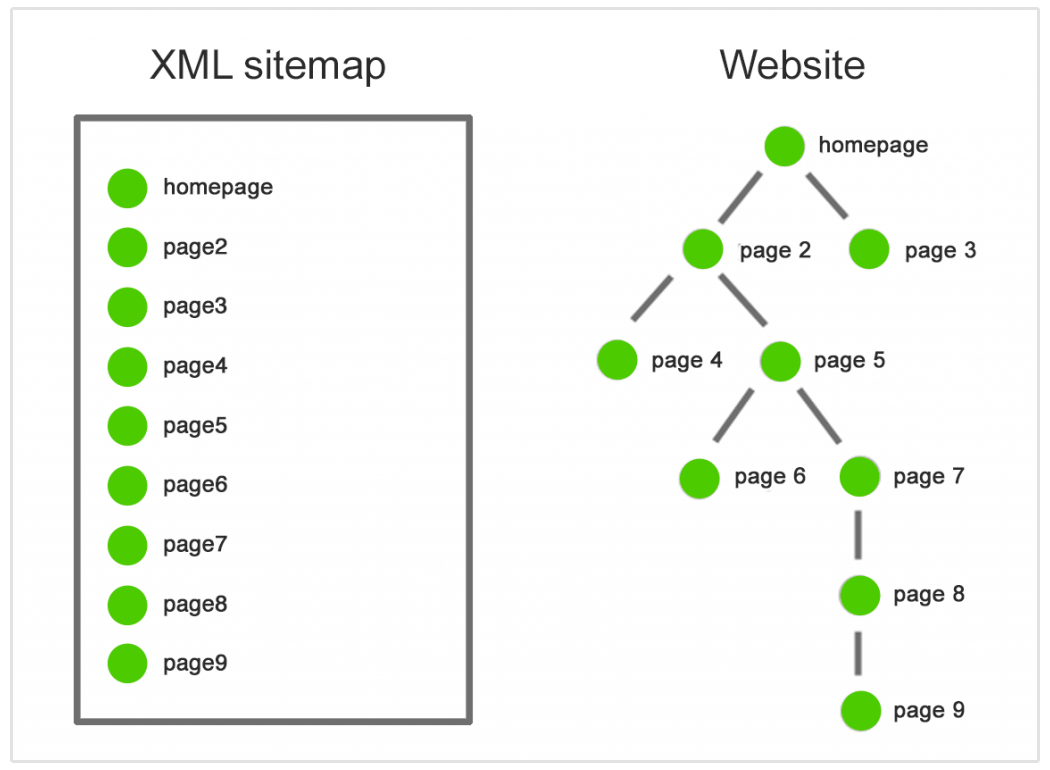
A recruiter might ask this question to assess your understanding of how to improve a site's crawlability and ensure comprehensive indexing by search engines.
Here's a sample answer for this interview question:
An XML sitemap is a file that lists all the important pages of a website, helping search engines like Google discover and crawl them more efficiently.
It acts as a roadmap, ensuring that search engines can find and index all relevant content, especially pages that might be buried deep within the site or are not well-linked. By providing a clear structure, an XML sitemap enhances the visibility of your site’s content and can improve indexing.
What is structured data, and how does it impact SEO?
This question is used to evaluate your knowledge of advanced SEO techniques and your ability to implement strategies that enhance how search engines interpret and display your content.
Here's how you can answer this question in your SEO interview:
Structured data is a standardized format used to provide information about a webpage and classify its content. It's often implemented using schema markup, which helps search engines understand the context of the information on the page.
This enhanced understanding can lead to rich snippets, like star ratings, FAQs, and event details, appearing in search results, which can improve click-through rates and visibility.

How do you identify and fix crawl errors?
Crawl errors are a common thing in the world of SEO, so your interviewer will likely ask this question to understand how you find crawl errors.
You can say something like:
To identify and fix crawl errors, I use tools like Google Search Console, which provides a report of any issues search engines encounter while crawling the site. Fixes might involve creating proper redirects, repairing broken links, or ensuring the server is properly configured. I then resubmit the fixed URLs for crawling in Search Console to confirm the issues are resolved.
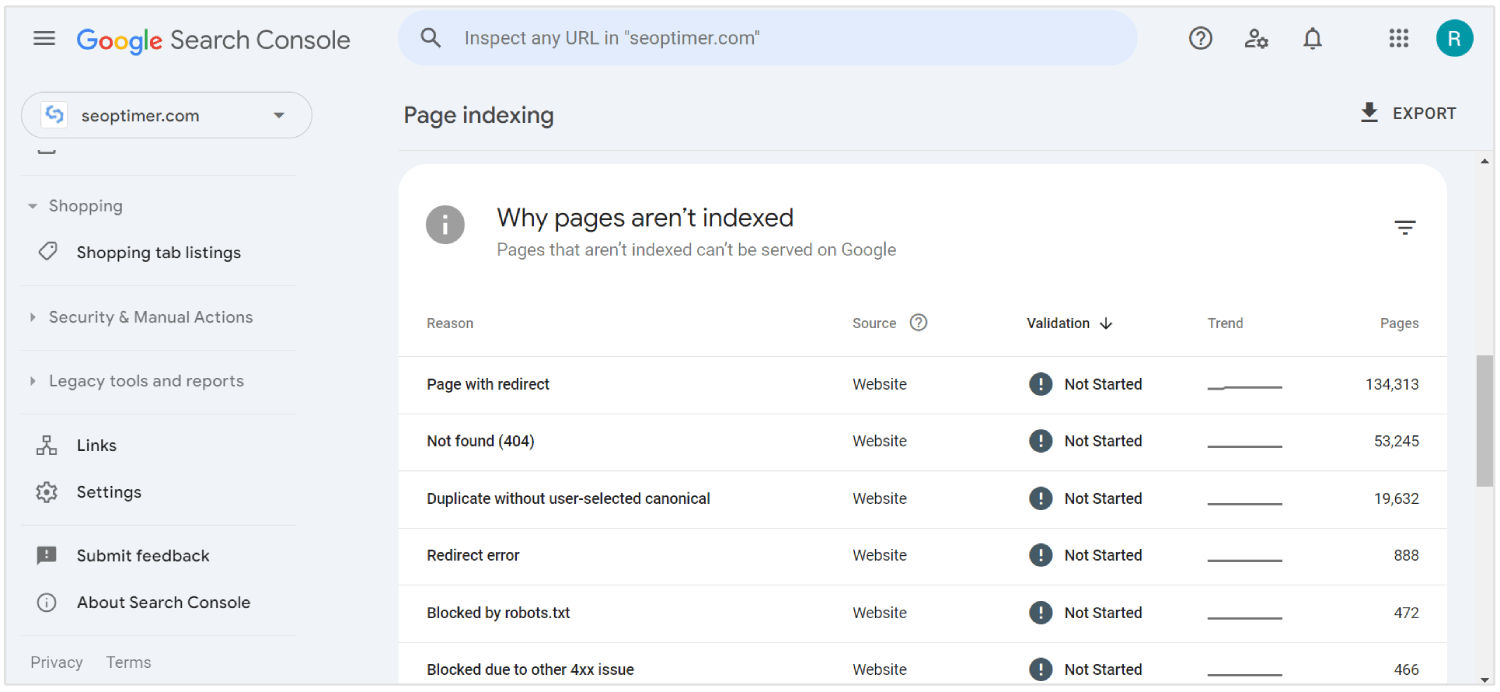
What are 301 and 302 redirects, and when should you use them?
Proper use of 301 and 302 redirects is crucial for maintaining rankings and ensuring a smooth user experience when URLs change.
So a hiring manager might ask this question to gauge your understanding of how to manage redirects effectively without harming SEO.
Here's a sample answer that you can use when thinking of how to answer this interview question:
A 301 redirect is a permanent redirect that transfers the majority of link equity from the old URL to the new one. It should be used when a page has permanently moved to a new location, ensuring that search engines and users are directed to the correct page. In contrast, a 302 redirect is a temporary redirect that does not pass link equity, and is appropriate when a page is temporarily moved or undergoing maintenance.
How do you handle site migrations while preserving SEO?
Answer: Start by developing a detailed migration strategy, which includes creating a comprehensive URL mapping to ensure all old URLs are redirected to the new ones using 301 redirects.
Update internal links throughout the site to reflect the new structure and ensure all new pages are fully optimized for SEO.
How do you optimize a website’s URL structure for SEO?
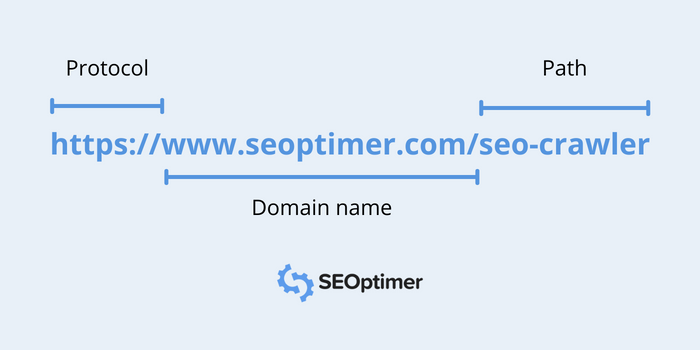
To optimize a website’s URL structure for SEO, follow these best practices:
- Ensure URLs are concise and clear
- Use hyphens to separate words in the URL
- Add your target keyword naturally in the URL
- Ensure all URLs use lowercase letters to avoid issues with duplicate content
Off-Page SEO Interview Questions
Can you explain the concept of domain authority and how it affects SEO?
Domain authority (DA) is a metric that predicts how well a website is likely to rank in search engine results. It’s scored on a scale from 1 to 100, with higher scores indicating a greater ability to rank.
Domain authority is determined by various factors, including the quality and quantity of backlinks pointing to the site, the relevance of the content, and the overall trustworthiness of the domain.
A site with high domain authority is more likely to rank higher in search engine results, especially for competitive keywords.
While it’s not an official ranking factor used by Google, domain authority is a good indicator of a site's overall SEO health and its ability to perform well in search.
What are backlinks, and why are they important for SEO?
Backlinks are links from one website to another. They signal to search engines the value and credibility of the content on the site receiving the backlink.
The more high-quality backlinks a page has, the more likely it is to rank well in search engine results. Backlinks are a crucial ranking factor because they help search engines determine the authority and relevance of a webpage.
How do you build high-quality backlinks?
Here are a few effective strategies for building high-quality backlinks:
- Create valuable content: Develop shareable and informative content that naturally attracts backlinks.
- Guest blogging: Write for reputable sites in your industry to gain exposure and earn backlinks.
- Broken link building: Identify broken links on other sites and offer your content as a replacement.
- Influencer relationships: Network with influencers and industry leaders to earn endorsements and backlinks.
- Relevancy and authority: Focus on acquiring backlinks from relevant and authoritative sources to enhance SEO impact.
Can you explain what link juice is and how it affects SEO?
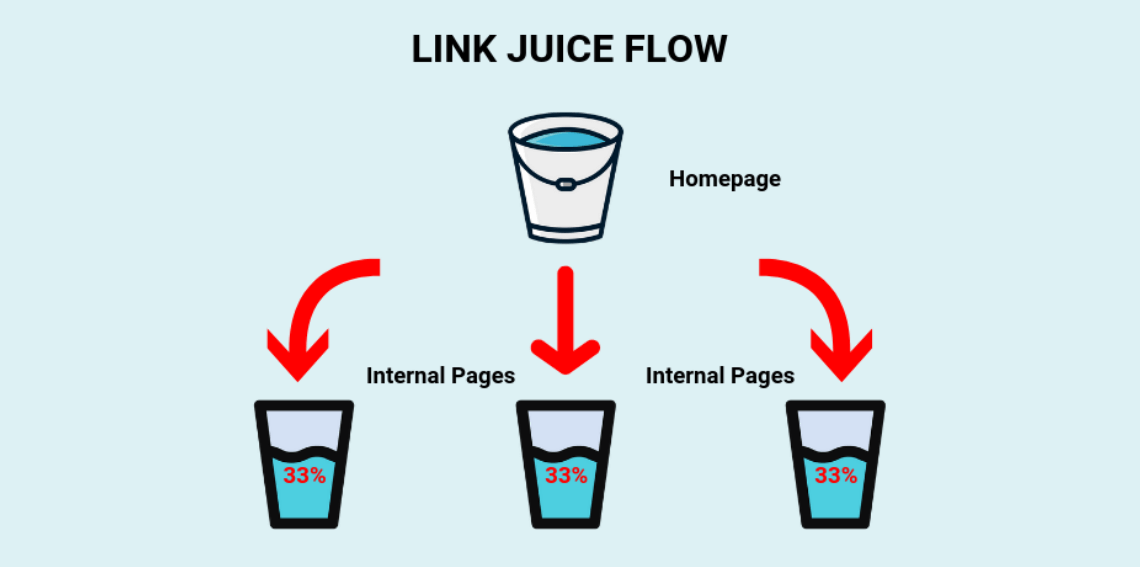
Link juice refers to the value or authority passed from one page to another through hyperlinks. When a page links to another, it transfers some of its SEO authority, or link juice, to the linked page.
This can help improve the linked page's ranking in search engine results.
This question is often asked to gauge your understanding of how link-building strategies impact SEO and your ability to leverage internal and external links to improve site rankings.
What are some common link-building mistakes to avoid?
Here are some common link-building mistakes to avoid:
- Buying links: Purchasing backlinks can lead to penalties from search engines, as it violates their guidelines.
- Using irrelevant links: Acquiring backlinks from sites unrelated to your niche can harm your site's credibility and SEO.
- Over-optimized anchor text: Repeatedly using exact-match keywords in anchor text can appear manipulative and lead to penalties.
- Ignoring link quality: Focusing on the quantity of backlinks over quality can result in low-value links that don't positively impact rankings.
- Building links too quickly: Acquiring a large number of backlinks in a short period can raise red flags with search engines, potentially leading to penalties.
- Relying on a single source: Depending too much on one link-building tactic, like guest posting or directories, can limit your site's growth and make it vulnerable to algorithm changes.
- Neglecting to monitor backlinks: Failing to regularly check and manage your backlink profile can result in harmful links going unnoticed, which can negatively impact your site's SEO.
Can you explain what a PBN (Private Blog Network) is and its risks?

A Private Blog Network (PBN) is a collection of websites built to generate backlinks to a primary site with the aim of manipulating search engine rankings.
The risks include severe penalties such as de-indexing of the sites involved, which can irreparably harm a site's credibility and search visibility.
How do you monitor and maintain your backlink profile?
Here are some ways to monitor and maintain your link profile:
- Regular audits: Conduct frequent audits of your backlinks to identify and disavow any harmful or spammy links that could negatively impact your site's credibility.
- Track new and lost links: Keep an eye on both new and lost backlinks to understand how your link profile evolves over time.
- Analyze link quality: Evaluate the quality and relevance of the sites linking to you, ensuring they align with your niche and contribute positively to your SEO efforts.
- Diverse link profile: Maintain a diverse and natural backlink profile by acquiring links from various reputable sources.
Local SEO Interview Questions
If you're interviewing at a local SEO agency, then you should also prepare to answer some local SEO interview questions in addition to the other questions we listed above.
What is local SEO, and how do you optimize for it?
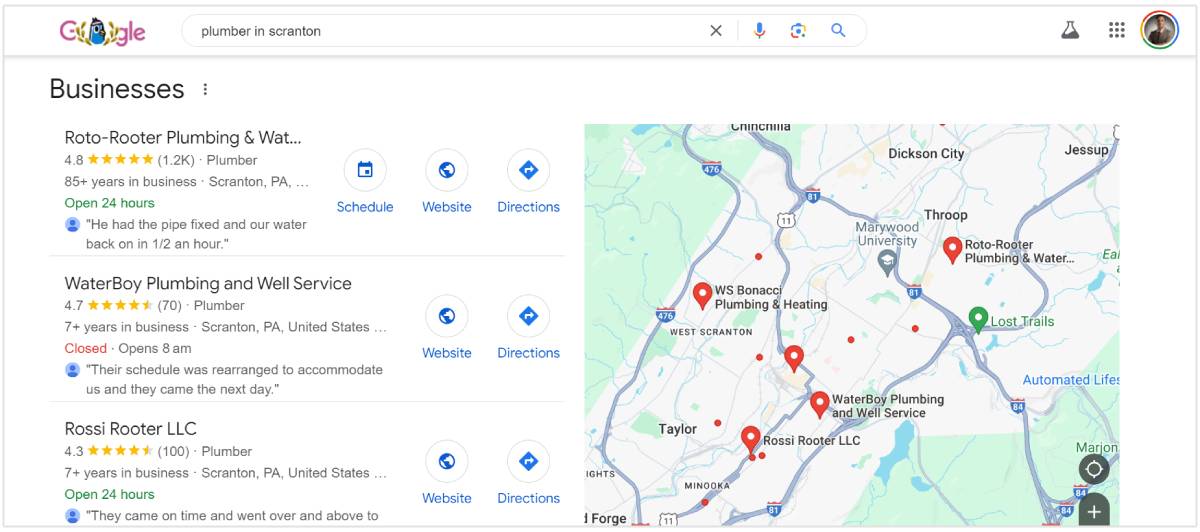
Local SEO is the process of optimizing a website to rank higher in local search results, making it more visible to users searching for products or services in a specific geographic area. This is important for businesses that operate in a particular location or serve local customers.
How to optimize for local SEO:
- Claim and optimize your Google Business Profile (formerly Google My Business). Ensure your business name, address, phone number (NAP), and other details are accurate and consistent across all platforms.
- Build local citations by listing your business in online directories, such as Yelp, Yellow Pages, and local chamber of commerce sites.
- Use local keywords in your content, meta tags, and headings to target searches with local intent (e.g., "best coffee shop in [city]").
- Encourage satisfied customers to leave positive reviews on your Google Business Profile and other relevant review sites.
- If you have multiple locations, create separate location pages on your website, each optimized for the specific area it serves.
- Ensure your website is mobile-friendly, as many local searches are conducted on mobile devices.
What is NAP consistency, and why is it important for local SEO?
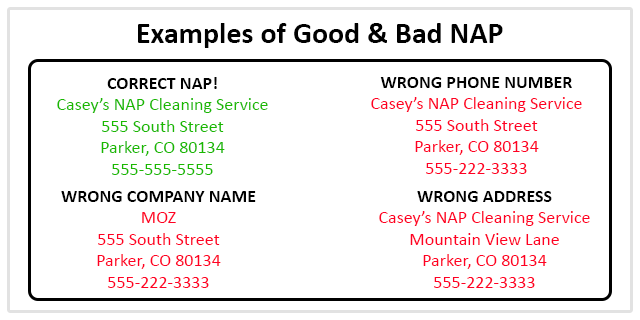
NAP consistency refers to the uniformity of a business’s Name, Address, and Phone Number across all online platforms, including its website, social media profiles, local directories, and review sites.
Why it’s important for local SEO:
- Credibility: Consistent NAP information builds trust with search engines and users. When search engines find the same information across different platforms, they consider the business more credible and are more likely to rank it higher in local search results.
- Avoiding confusion: Inconsistent NAP details can confuse potential customers and search engines, leading to lower rankings and missed business opportunities.
- Improved local rankings: Google and other search engines use NAP information to verify the legitimacy and location of a business. Consistent information helps improve local search rankings by ensuring that the business is recognized as trustworthy and relevant to local queries.
What is geotagging, and how does it impact local SEO?
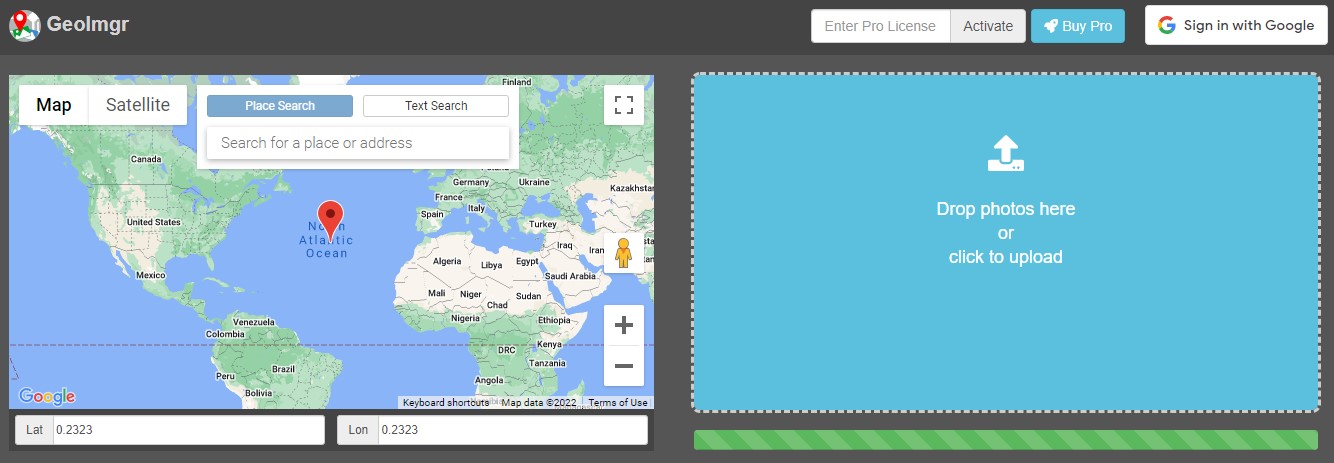
Geotagging is the process of adding geographic location data to digital content, such as photos, videos, or social media posts.
Geotagging helps search engines understand the geographical relevance of your content. This can improve your local search visibility, especially if your content is associated with specific locations.
How to Prepare for SEO Interview
Here are some practical tips to help you prepare for your SEO interview:
Research the Company
Understand the company's SEO strategy and their position within the industry. Familiarize yourself with their website, current SEO practices, and any recent updates or challenges they might be facing.
Researching the company and role as much as possible will give you an edge over the competition.
- Hanne Keiling, Creator Marketing Lead at Miro
Prepare Past Successes
Be ready to discuss specific examples of successful SEO campaigns you've worked on. Highlight the strategies you implemented and the measurable results achieved.
Know the Company’s SEO Strategy
Research the company you’re interviewing with. Understand their current SEO performance, target audience, and competitors. Be ready to discuss how you can contribute to their SEO goals.
I’d suggest running an SEO audit of the company’s website, and then giving the interviewer some suggestions on how to improve the company’s SEO.
You can run a free audit using SEOptimer’s SEO Reporting Tool.
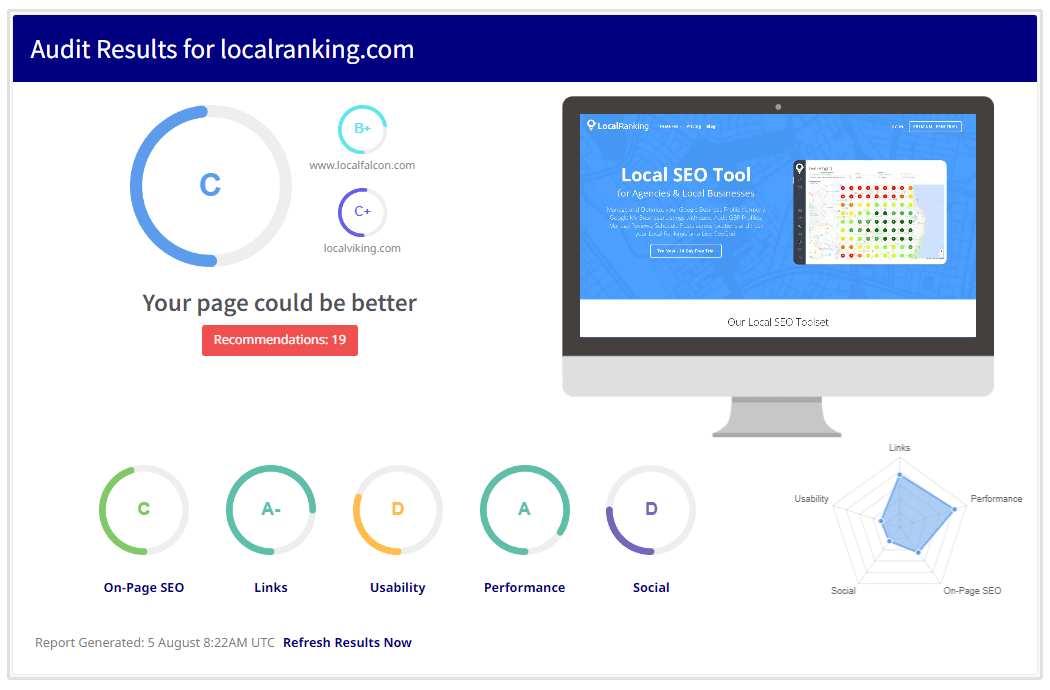
Prepare Your Questions
Have thoughtful questions ready to ask the interviewer. This could include inquiries about the company’s SEO goals, team structure, or the tools they use.
Ace Your SEO Interview
Preparing for your SEO interview is key to boosting your confidence. By thoroughly reviewing the commonly asked questions we've listed above, you can effectively prepare yourself to handle a variety of topics and demonstrate your skills and knowledge.
With a solid understanding of SEO concepts, tools, and best practices, you’ll be well-equipped to impress your potential employer and make a strong impression.










